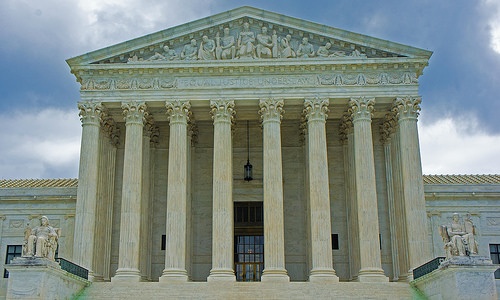Legislatures and lower courts have traditionally been responsible for developing Internet law in the United States, but recently the U.S. Supreme Court has been asserting a more active role in shaping Internet law jurisprudence. In 2015, the Court considered whether a Facebook post constituted a “true threat” in Elonis v United States, and this summer, the Court will determine the constitutionality of a prohibition on former sex offenders using social media in Packingham v. North Carolina. Packingham, like other cases heard by the high court so far this term, will be resolved by eight justices.
This week, the potential ninth justice—Judge Neil Gorsuch—begins confirmation hearings before the U.S. Senate Judiciary Committee. As the Court takes a deeper look at cases concerning Internet and social media law, the seat vacated after the death of Justice Antonin Scalia could be instrumental in determining the future of Internet and social media law.
Gorsuch has the expected pedigree of a Supreme Court nominee: he is an appellate judge on the U.S. Court of Appeals for the Tenth Circuit, a former deputy associate attorney general with the U.S. Department of Justice, a former clerk for Justices Byron White and Anthony Kennedy, and a graduate of Harvard Law School. His views of Internet and social media law, however, are less certain, although his record on the Tenth Circuit bench provides a glimpse into where he may stand on Internet law issues.
In U.S. v. Ackerman, Gorsuch lived up to his reputation as a constitutional originalist, turning to the framers in determining that the Fourth Amendment protects emails from searches. Gorsuch wrote that the “warrantless opening and examination of private correspondence…seems pretty clearly to qualify as exactly the type of trespass to chattels that the framers sought to prevent when they adopted the Fourth Amendment.” Gorsuch added that “a more obvious analogy from principle to new technology is hard to imagine.”
In a second privacy case, U.S. v. Christie, Gorsuch concluded that although a warrant to search a computer for evidence relating to a crime was broad, it satisfied the Fourth Amendment’s particularity requirement.
In Mink v. Knox, a district attorney pursued criminal libel charges against a publisher of an online journal. Gorsuch wrote a concurring opinion, agreeing with the majority that the speech was protected as parody but cautioning the majority on the extent to which parodies may be safeguarded. Gorsuch opined that “the Supreme Court has yet to address how far the First Amendment goes in protecting parody. And reasonable minds can and do differ about the soundness of a rule that precludes private persons from recovering for reputational or emotional damage caused by parody about issues of private concern.”
Gorsuch also wrote a concurring opinion in Direct Marketing Association v. Brohl, upholding a Colorado law requiring online retailers without brick-and-mortar locations in the state to notify consumers of sales tax liability and report the information to the Colorado Department of Revenue.
In the copyright context, Gorsuch authored an opinion in Meshwerks, Inc. v. Toyota Motor Sales USA, Inc., determining that Meshwerks’ digital models of Toyota’s vehicles copying Toyota’s designs were not entitled to copyright protection. “While fully appreciating that digital media present new frontiers for copyrightable creative expression, in this particular case the uncontested facts reveal that Meshwerks’ models owe their designs and origins to Toyota and deliberately do not include anything original of their own; accordingly, we hold that Meshwerks’ models are not protected by copyright and affirm,” Gorsuch wrote.
In Doe v. Shurtleff, a case analogous to Packingham, Gorsuch joined a panel opinion in upholding the constitutionality of a Utah statute requiring convicted sex offenders to register all online usernames.
With the U.S. Supreme Court taking a more engaged role in Internet and social media law, the vote of a 49-year-old Justice Neil Gorsuch, if confirmed, could prove critical in shaping Internet law for years to come.
Specialty Technical Publishers (STP) recently published an entirely new chapter, available as a separate guide, on U.S. Social Media Law in its publication Internet Law: The Complete Guide, and provides a variety of single-law and multi-law services, intended to facilitate clients’ understanding of and compliance with requirements. These include:
Audit, Compliance and Risk Blog
Michael Lambert
Recent Posts
Supreme Court Nominee’s Record Provides Insight into Views on Internet and Social Media Law
Posted by Michael Lambert on Thu, Mar 23, 2017
Tags: Business & Legal, Internet
Buzz, buzz. Ring, ring. Your eyes are instantly open as the sharp sounds of your smartphone alarm ring in your ears. After reaching over to quell the noise, you jump out of bed, eager to begin your first day as director of marketing for Tech, Inc. Your workday begins with HR orientation. Without much explanation, your hiring manager drops reams of paperwork on your lap. One of the documents is titled “Tech, Inc. Social Media Policy,” while another is a form seeking your personal social media account usernames and passwords. After orientation, you are escorted to your new office, which, to your chagrin, is a small cubicle instead of a plush corner suite. You are assigned your first task: to launch an advertising campaign comparing Tech to rival company, Widget, Inc., along with a promotion in which customers pick three numbers for $2 for a chance to win Tech’s latest gadget. You proudly squeeze promotional information, a slight jab at Widget, and a photo of the prize in a 140-character tweet. After a long first day of work, you arrive at home and post to Facebook: “First day of work. :-) HR sucks. Cubicle is tiny. :-) Thinking about complaining. #newjob #TechInc #funemploymentover #realworld.”
Read More

